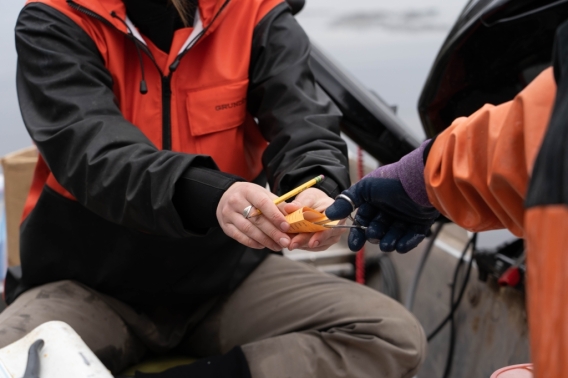Research Collaborators
The partners who make it all possible
Staff at the Northern Highland Fishery Research Area (NHFRA) collaborate with universities, anglers, state hatcheries, tribal partners and conservation groups across the state and country to help meet fisheries research needs. These diverse partnerships allow us to leverage efforts and answer more complex research questions by working together.
It is from the dedication of NHFRA staff and our collaborators that the NHFRA can continue its fishery research legacy, benefitting fisheries throughout Wisconsin and beyond.
University of Minnesota-Duluth
The NHFRA works with the Biology, Integrated Biosciences and Water Resource programs to provide research opportunities and inspire the next generation of scientists.
The College of Natural Resources at UW-Stevens Point promotes critical thinking and problem-solving strategies based on integrated resource management and education. The College of Natural Resources is home to six distinct academic disciplines: Fisheries and Water Resources, Forestry, Human Dimensions of Natural Resource Management, Paper Science and Chemical Engineering, Soil and Waste Resources, and Wildlife Ecology.
UW-Madison, Center for Limnology
From the Hasler Laboratory of Limnology in Madison to Trout Lake Station in northern Wisconsin, the Center for Limnology has been a leader in the field of limnology, aquatic ecology and ecosystem science since the early 1990s.
UW-Madison, Trout Lake Station
Just down the road from the NHFRA, Trout Lake Station is a year-round field station operated by the Center for Limnology at UW-Madison. The station has supported environmental and limnological research, training and outreach in the Northwoods of Wisconsin since 1925.
UW-Madison, North-Temperate Lakes Long-term Ecological Research Site (NTL-LTER)
The NTL-LTER program is part of a larger LTER network funded by the U.S. National Science Foundation, conducting and facilitating long-term ecological research on Wisconsin lakes.
University of Notre Dame Environmental Research Center (UNDERC)
The University of Notre Dame Environmental Research Center (UNDERC) provides unique research opportunities that incorporate both aquatic and terrestrial systems, along with valuable hands-on experiences for both undergraduate and graduate students.
Great Lakes Indian, Fish and Wildlife Commission (GLIFWC)
Formed in 1984, GLIFWC represents eleven Ojibwe tribes in Minnesota, Wisconsin and Michigan, providing natural resource management expertise, conservation enforcement, legal and policy analysis and public information services in support of the exercise of treaty rights during well-regulated, off-reservation seasons throughout the1836, 1837, 1842 and 1854 Ceded Territories.
Lac Du Flambeau Band of Lake Superior Chippewa
Inhabiting the Lac du Flambeau area since 1745, the Band seeks to provide leadership for the betterment of tribal membership and descendants in the areas of health, education, welfare, economic and job development and the protection of natural resources.
Mole Lake (Sokaogon Chippewa Community) Band of Lake Superior Chippewa
The Sokaogon Chippewa Community is located in the town of Nashville, Wisconsin, and utilizes state-of-the-art technology to promote the conservation of their environment for future generations.
USGS Midwest Climate Adaptation Science Center (Midwest CASC)
Based at the host institution, the University of Minnesota, Midwest CASC is a group of research-focused academic, Tribal and non-profit partners working collaboratively with the United States Geological Survey (USGS). Midwest CASC brings together scientists, natural and cultural resource managers and members of the public to develop relevant, actionable science for the Midwest region.
USGS Wisconsin Cooperative Fishery Research Unit
A partnership between the U.S. Geological Survey, the Wisconsin Department of Natural Resources, and the University of Wisconsin-Stevens Point that is focused on providing world-class fisheries and aquatic research, education and training of students in fisheries and aquatic sciences, and extension services in fisheries and aquatic resource management.

